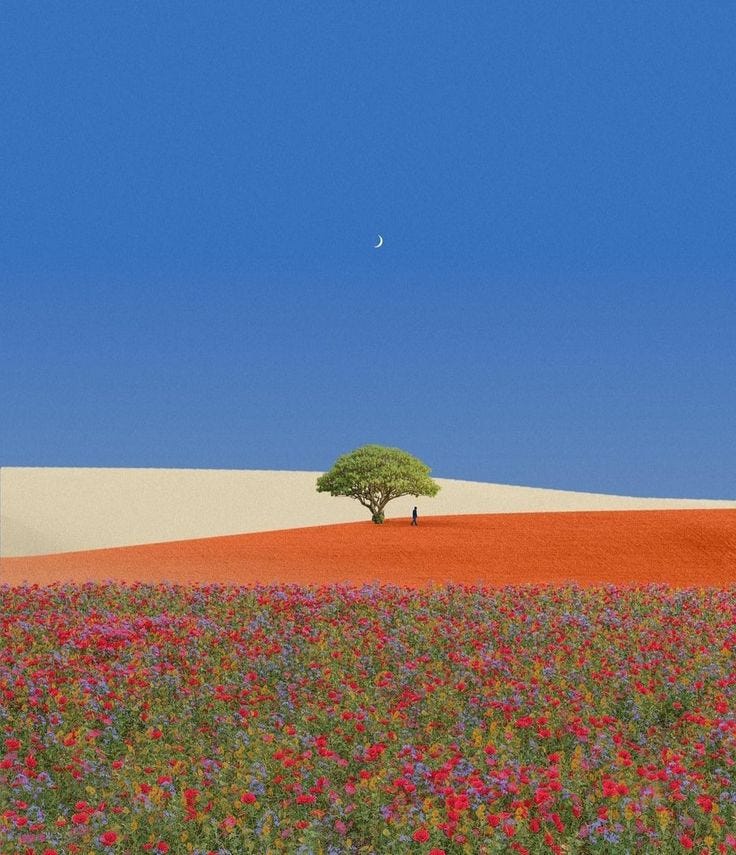Artwork by Andhika Ramadhian
It is undebatable that we all come to terms with our mortality. Some of us become aware of this reality at a young age, yet it remains ignored until we feel the wizened ache in our bones. There is hubris in youth and humility with ageing, as the spring in our steps becomes tenuous.
Yet the knowledge of mortality does not preclude our desire for life; our existence’s finite nature makes us thirst for the unbounded embrace of the world. Thus, you might find those whose embers do not shrink in the face of death. If our light retains its refulgence even when we approach the end, rejections should not dim our light.
On the first ‘no’
The first rejection we receive is the knowledge that life ends—no, you will not live forever. However, we take this rejection in stride and acknowledge its consequences. Then, we spend our days making substance out of every moment because they are finite. It is as if each moment—morning, breath, victory, and loss—denotes a new beginning, heralding primaveral desires.
The most poignant wish we evoke from our ages of innocence is to live well. Therefore, all other rejections from chasing this dream pale in comparison to the ‘first no.’ Still, the ‘first no’ is not a rejection but acceptance. We cherish life because our cells lack immortality, but a universal tenet is that our cells merely transform into another form, seeking universal embrace.
To give a synopsis of our lives
If you were to give a summary of your life until this moment, you would struggle to find the right words. We can always weave stories of our highs and lows without prompt when we find a chance to share a lesson.
When the people dear to us are in low spirits, we do what we know how to do: we share stories. We share our tales of failure and tell them of how we have faced rejections. In the end, we share stories of our lowest moments so would not feel alone in misery.
“Look, I have also failed, but I am here today, hale and starting again...”
As social beings, we enjoy giving unsolicited advice and often cringe at receiving it. However, we perform this act often because we cannot bear seeing people fail, except you are a zealous misanthrope. Indeed, writing entails sharing stories of your losses, victories, and even ennui events. Nobody wants to read only stories of victors; sometimes they want to see the victors lose.
Now, if we were to give an account of our lives, we would begin with the losses we faced and end with our triumphs. These rejections signify our resistance to stagnation, as few losses mean fewer beginnings.
The sole wager
The past years have seen a rise in gambling in this part of the world. Men stake the little in their pockets against the odds set by imperious establishments, and the house always wins. These bets continue because they desire a fortuitous break, a victory against the ensnaring jaws of poverty. These men eye the lucky man who beats the odds and becomes the one in a million. Nonetheless, the establishments are the happiest winners.
If you are to wager, bet on yourself climbing the mountain to better fortunes. Take a leap of faith and believe you can do great work despite how difficult it appears. I remain ever optimistic because I believe my whole life lies ahead. This plucky spirit might seem naïve, but naivety encumbers all ages. The juiciest odds you will discover will dare you to become great. I do not believe hard work gets easier; rather, we become accustomed to its rigours until we become dogged zealots.
We hold the title of the most intelligent creatures because we dared to explore and understand the universe. Rejection and failure birth beginnings because chance and control are intertwined. In taking those bets of greatness, you embrace adroitness as your lifelong ally.
“In the end, though, luck is a short-term friend or foe. Skill shines through over the longer time horizon.” Maria Konnikova
Dusk as Dawn’ herald
As a child, I yearned for the year’s end, eager to celebrate, in awe of the joy on the faces of my parents. As an adult, I approach the year’s end with tranquility and less vigour than I did as a child. The Sun’s new revolution excites me less, but the exuberance of my folks still seeps into my heart.
As the year reaches its end, I do not make reflections, but I acknowledge my beginnings. Each dawn is what you make it to be and the next second is a beginning, like the end of this week’s letter. On the approach of dusk, my heart beams at the herald of dawn.



